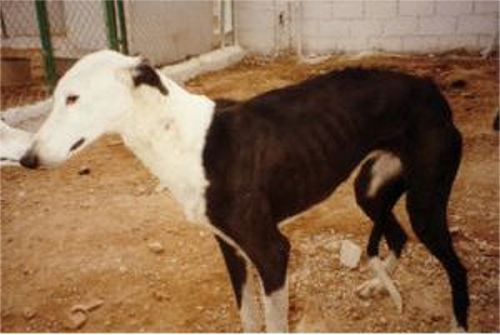The Story of Ibiza

Ibiza in her rescue kennel in Spain
I went alone for a week in December 1993 to the interesting old city of Salamanca in Spain, to take a course in the Spanish language for the purpose of aiding my work to help the greyhounds in Spain. Salamanca was far away from the Mediterranean coast where I had previously poked my nose into the tracks and kennels of the greyhound stadiums. One thousand unfortunate greyhounds are brought there each year from Ireland, to race their hearts out. My relations with the tracks had deteriorated because the Ministry of Agriculture sent my criticism to the directors of the tracks. The directors, particularly at Valencia and Mallorca, were furious, to such an extent that I was warned it would actually be dangerous for me to return.
Needless to say, my concern for the welfare of Greyhounds took me to the refuge outside of Salamanca. About 200 dogs and cats and one baby fox were being tended there by several kind helpers, some of them doing social work instead of National Service. The animals were secure, and had regular meals. There was the usual flow of dogs and cats in and out during the course of the day. The kennels consisted of several concrete shelters within paddocks housing about five dogs. The dogs lie mainly on rough concrete and eat and drink out of communal troughs. They all looked well and happy but it was difficult to rid them of the ticks. A caretaker lived there permanently. There were several Spanish-bred greyhounds, correctly called galgos, but only one dog with an ear-mark who would be registered somewhere as a hunting dog. She was painfully thin, her pelvic bones were protruding and her face appeared bumpy and bony under her thin skin. She was timid and gentle, and too polite and retiring to be able to cope with the battle for food among the five dogs. She limped because of a swollen foot, possibly caused by an old fracture, and she had an infected lump on her chest due to a pressure sore. She was white and black, with one of the most beautiful long tails I had ever seen. She seemed to expect nothing from anyone and stoically accepted her pathetic condition, having long ago given up any hope of affection and attention.
I couldn’t get her out of my mind. The next day I went again, with towels for her to lie on, and some antibiotic cream and bandages.
It was obvious that finding a home for her in Spain would be impossible. She had a chance in the U.K., Switzerland or Germany- but how could I get her there? If I had had a car and lots of money and time, it would have been so much easier. I had none of these things, and furthermore was laden with a heavy suitcase of books and clothes, and I was staying in a hostel without facilities.
I decided finally that she must come with me to Madrid. To arrange export to England would be nigh on impossible from Salamanca where there is no international airport. My aim was to get her to the island of Mallorca, to English kennels and friends I knew who could carry out the necessary export procedures. But I didn’t have a box for the air travel or the time to get there and back before my return flight to England, back to my nursing job. Export arrangements take a lot of time and trouble.
I decided to cancel my last day at the language school. I lost the money on my return bus fare to Madrid and instead hired a taxi which would take a dog – not an easy task in Spain. The journey from Salamanca to Madrid is about 150 miles and costs a fortune by taxi. I somehow had to find some kennels in Madrid. The Sociedad de Protector de Animales in Salamanca had the same difficulty as I did trying to contact ANDA, the animal welfare society in Madrid. Neither of us could get an answer.
By chance, while walking around Madrid the previous weekend, I had seen a poster on a lamp-post with an address of another welfare society, not previously known to me or to the Sociedad’s director at Salamanca. I tried them. They answered and then said I could bring the dog.
When I arrived, their office was closed for the siesta. I had one or two hours to kill with the dog and my suitcase, in a busy street in the heart of Madrid! I sought a cheap hostel in the neighbourhood to dump my luggage. The idea of taking a dog into the hostel was met with utter astonishment, of course, and a refusal. I was most conspicuous in the centre of Madrid with a skeleton-like greyhound. The taxi driver was an angel and although he couldn’t comprehend what on earth I was about, he would not leave me alone with my problem. He even found a supermarket for me where we bought some food for the dog which could be opened without a tin-opener.
Eventually the office re-opened and I was welcomed in such a way that I nearly burst into tears with relief. The last 24 hours had been a nightmare. Everything I tried to do had been met with a refusal and shrug of the shoulders, almost as if there was some pleasure to be gained in being able to refuse help. Someone in the office even spoke English, which was an enormous relief, and I overflowed with a torrent of words, able at last to express my feelings in my native tongue!
The dog, Ibiza, ate well, and silently closed her eyes in an upright position, not quite submissive or confident enough to lie down and not sure of what lay in store for her next. She wasn’t used to security and affection and didn’t yet know how to respond. I have seen this sort of “depression” in several greyhounds in England, where they were born and reared in kennels and used only as running machines for profit. This is why they are so often ignored in rescue kennels when people come to choose a pet. The same emotionless phenomenon exists in humans who have been deprived of love. In time, of course, with patience and constant kindness, they thaw and can respond in the normal way.
Ibiza was taken to kennels outside Madrid and promised a soft bed, good food, veterinary care, and love. Upon my return to England I would set in motion plans for her future- was it to be England and six months quarantine? How could I pay for it? Or would it be Zurich or Germany? But how would I get her flown internally to Mallorca?
At 9:00 pm, at the end of a long day, I needed my first bite of food. I found a bar that served “tapas” and began to tuck into a plate of ” patatas fritas.” Then I heard, from the overhead television, the ubiquitous trumpet fanfare of the bull-fighting in Sevilla. I watched a large black bull slowly topple, blood pouring from its spear-ridden shoulders as it fell dying on the sands of the arena, wet with rain and blood. It was difficult to swallow the next mouthful. In God’s name how is it that man can be so blind to the suffering of the innocent? How far have we really come in our civilization? Such cruelty and acts of neglect reflect our behaviour as human beings and diminish us. And yet one must not forget the small devoted groups of people striving to turn the tide of evil to good. Even the taxi driver looked at Ibiza with emotion and called her a “santa.”
Later, on my return to England, I heard of an English lady, in Alicante on the mainland, who would fetch Ibiza from Madrid and take her to her own kennels. The kennels in Madrid must have been very neglectful. She found her now with five ulcers and was very thin and miserable. The vet in Alicante said that four more days in those kennels and she would have died.
But now she was in safe hands. When she regained her strength, she was driven to England and went to quarantine kennels five minutes from my home where I could visit her regularly. At the end of her six months’ confinement she found a home with three whippets, and now lives in perfect bliss behaving like a puppy curling up together with her new little friends. She brings enormous joy to the family who so kindly offered her a home.
Her racing details (from her ear-mark) arrived from the Spanish Federation on the day of her fourth birthday. Her real name was Taranta.
But we called her Santa.
Anne Finch
Written for USA publication: Greyhound Tales ; True stories of Rescue, Compassion and Love.
Ed.Nora Star. 1997.
